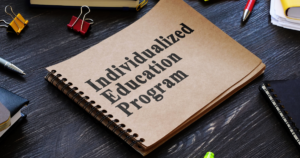The Individuals with Disabilities Education Act (IDEA) states that every student (between the ages of 3 and 21) with a disability that adversely impacts their academic progress is entitled to a free appropriate public education (FAPE). This means that school districts must provide these students with access to a range of educational services designed to address their particular circumstances.
Special education costs are high and aid from the government has declined over the years, placing more financial pressure on the school districts. However, school districts remain legally obligated to provide a program that can appropriately address your child’s specific needs. When the school district fails to offer an appropriate program, or if it does not offer a plan at all, you should contact an experienced education law attorney.
 What Is Special Education?
What Is Special Education?Special education is defined as specially designed instruction created to meet the unique needs of the student. Although school districts attempt to incorporate students with special needs into the mainstream to the greatest extent possible, there are instances when a child’s disability requires that they receive additional and individualized attention.
The IDEA lays out the responsibilities of school districts regarding special education. To the greatest extent possible, school districts should incorporate special education students into the general education setting with the rest of their classmates. When that is not possible, the districts must find suitable alternatives, which are to be included in the student’s Individualized Education Program (IEP). An IEP establishes a basic framework for the education of a child who requires special education services. Notably, it details the instructions, support, and services the student requires. Also, parents are entitled to participate in the development of their student’s IEP.
Before a child receives an IEP, they must first be identified and evaluated by the school district (the evaluation request is generally made by parents or teachers).
During the evaluation, the school district will record a child’s strengths and weaknesses, and from there, schedule an IEP meeting. At this meeting, the results of the evaluation(s) will be discussed as well as options for how to appropriately educate the child. Those who are involved in this meeting include:
If you are unable to attend the IEP meeting, you can reschedule or make other arrangements to attend (remotely or by phone). However, most school officials prefer to address these issues face-to-face.
Ultimately, a plan will be established and put into a written document that the parents will be asked to sign. If the parents disagree with the final version of the IEP, they can refuse to sign. However, the parents must inform the district of their objection within 15 days of receiving the proposed IEP. Otherwise, the program will take effect (even without their signatures).

Although you are involved in the process of developing your child’s IEP, in the end, it will be the school district that produces the final program. There might be instances where you disagree with that plan for a variety of reasons. You might disagree with a small detail or a significant portion.
Therefore, it is recommended that you try to maintain a good working relationship with the school district. That way, if there is a problem, you can feel comfortable discussing it with the district to solve the issue as quickly as possible.
Whenever you have a problem with an IEP, you should bring it to the school district’s attention immediately and in writing (so there is a paper trail to catalog your concerns). If school administrators are reluctant to change the plan in accordance with your desires, you have several options available to you. For instance, two options include:
While these are the two most common options for parents, there are others available, such as:
As stated above, it is best to try to maintain a positive working relationship with the school. However, when efforts to work collaboratively with the district fail, you should contact an experienced education law attorney.
You want to have the best options for your child, particularly if they have a disability, and school districts are obligated to provide an education that is appropriate for your child’s unique circumstances. Lawyers at John Rue & Associates can help ensure that the district offers an appropriate program for your child. We provide parents who may need an education lawyer with a initial consultation for $100 (30 minutes by phone), and a more detailed consultation (90 minutes to 3 hours by Zoom) for a flat fee of $795. Call us at 862-283-3155 or contact us online for more information
John D. Rue is responsible for the content of this website. This website is designed for general information only. The information presented at this site should not be construed to be formal legal advice nor the formation of a lawyer/client relationship
Attention NJ Civil Rights Lawyers
LEARN MORE »